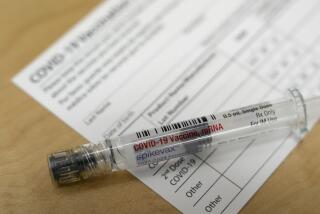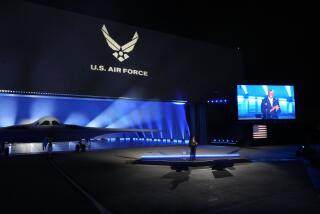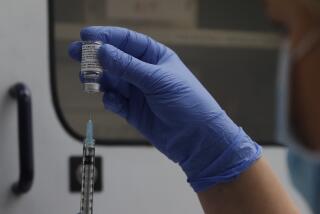Delay Possible in Anthrax Inoculation
- Share via
WASHINGTON — The military may soon have to slow a mandatory program to inoculate all troops against the deadly anthrax biological agent because of a delay in vaccine production, the Pentagon said Thursday.
Navy Rear Adm. Craig Quigley said Defense Secretary William S. Cohen would receive a report on the problem soon and would decide before he left for China on Monday if the program needed restructuring until a new anthrax vaccine plant in Michigan was approved by the Food and Drug Administration.
Responding to questions from reporters, the Pentagon spokesman said the military had only about 190,000 approved doses on hand--a 42-day supply--and was testing another 194,000 doses in storage for purity and safety.
Quigley declined to say whether an ambitious program to inoculate all 2.4 million active and reserve U.S. troops, begun in 1998, might be halted or simply slowed to concentrate on protecting troops going to perceived high-risk areas, such as the Gulf and South Korea.
“I’m not going to take away any of his [Cohen’s] flexibility and go into any detail on those options,” he told a Pentagon briefing.
With only 455,000 troops inoculated to date, the major problem is that a plant completed in Lansing, Mich., last year by BioPort Corp. has not yet been approved by the FDA to produce anthrax vaccine.
Quigley noted that the FDA found some 30 problems in the new plant in a key inspection last year.
No vaccine is currently being produced in the United States. And while the Defense Department has hundreds of thousands of older doses of anthrax vaccine in storage, Cohen has demanded stringent, time-consuming inspection of that supply before it is used.
Since the program was begun, 1.8 million doses have been used by the military, and 455,000 U.S. troops have received at least one of a series of three anthrax vaccinations to provide protection against the deadly biological agent, for which there is no known cure.
The program has been controversial, with small numbers of troops being punished for refusing to take the mandatory shots.
More to Read
Sign up for Essential California
The most important California stories and recommendations in your inbox every morning.
You may occasionally receive promotional content from the Los Angeles Times.










